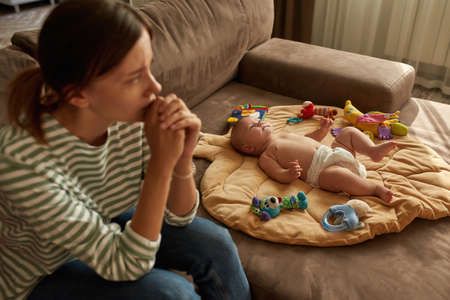1. WHAT IS PARENTAL BURNOUT ?
First of all, let’s start with a number :
5 % of parents suffer from parental burnout (at least according to the numbers, let’s not forget that the numbers are quite often below the actual figure).
Parental burnout is a relatively new phenomenon that describes the extreme exhaustion and stress that parents can experience when caring for their children. This can manifest itself as chronic fatigue, irritability, anxiety and depression, and can have serious consequences for the mental and physical health of parents, as well as for family dynamics.
Beware of common misconceptions !
- Contrary to what one might think, parental burnout does not only occur with very young children, far from it. There are not only parents with young children. Burn out can occur with a child of any age.
- No, there are not more women who suffer from it, but there are the same number of men and women who suffer from parental burnout.
2. WHAT ARE THE SYMPTOMS OF THIS FORM OF BURN OUT ?

Among the symptoms that can be found in a family burn out, there are: :
– Moral, emotional and physical exhausion due to parenting. Exhaustion that cannot be relieved by rest alone.
– A diminished fulfillment of one’s role as a parent. The impression of being a bad parent. .
– A progressive distancing from the children. The parent will act as one by being on automatic pilot. There is therefore less affection.
3. THE PHASES PRECEDING THE BURN OUT
The idealized family :
Perfection. Because of society, pressure or the fear of others’ judgment, parents will want to make sure that everything is perfect. Forgetting or putting aside the fact that perfection does not exist.
Over-investment :
This phase goes hand in hand with the idealization phase. Indeed, the parent will overinvest in the relationship, in the education of his child in order to get as close as possible to his ideal. This over-investment brings the parent to a feeling of being indispensable, which can be pleasant, but which comes to intensify all the more the vicious circle which has just started. Indeed, if we are indispensable, we cannot delegate tasks, everything depends on us…
It is not uncommon for the second parent to notice the over-investment of his or her spouse. Despite all their efforts, many times the parent starting to show burn out, leaves little room for the second parent, despite all their efforts.
Self-sacrifice :
The parent will identify only as a father or as a mother. The parent increasingly begins to forget themselves, to sacrifice themselves and to no longer be attentive to their needs.
Frustration :
Any parent can experience frustration. However, if this frustration lasts over time, it contributes to the development of burnout.
This frustration comes from different sources. The parent begins to feel as though he or she is not succeeding in achieving his or her ideal, the lack of recognition from a spouse or the awareness of all that the person is giving up for his or her investment in his or her children.
Loss of energy :
The parent begins to become exhausted, lacking energy. This parent will begin to experience a “slump”. This slackening can make the parent more irritable, less patient, develop depressive symptoms… In spite of all this, if the parent continues on the path he/she has taken until now, he/she will fall on the side of burn out. These phases will not be experienced in the same way by people who have developed parental burnout. The phases will not necessarily occur in this order or will not all be present. Some parents will have a particular phase that is much more developed than others… But their descriptions can be indicators of alter in the development of a parental burnout.
4. DIFFERENCE FROM POSTPARTUM DEPRESSION
- Postpartum depression occurs after childbirth and comes from a difficult transition to parenthood. Postpartum depression occurs within 12 months of birth.
- Parental burnout can occur either quickly after the birth or when the children are older. They are not related to a difficult transition, but rather to exhaustion related to the role of parent
5. WHAT ARE THE CONSEQUENCES OF BURN OUT ?

The consequences of burn out can be found with different actors :
The affected parent :
In parental burn out, we find symptoms and consequences similar to burn out or depression. Thus, the suffering parent will have much more difficulty managing his anger, irritability, he may develop addictions, sleep disorders, or even suicidal risks.
The spouse :
The spouse must compensate for the disinvestment of the parent suffering from parental burnout. Thus, the spouse may find himself or herself with such a heavy parental load that the spouse may also become exhausted. The parental burnout of at least one of the two parents can lead to marital conflicts.
The child or children :
Parental burnout will also have an impact on the child or children. Indeed, the latter may suffer from physical or verbal abuse or neglect.
6. WHAT ARE THE SOLUTIONS FOR PARENTAL BURNOUT ?

There are solutions to get out of a parental burnout. Often in the context of professional burn out, one of the solutions may be to leave the company. But what to do in case of parental burnout? So no, we are not going to suggest that you leave your children. Other less radical solutions exist.
Talk to your spouse
You may have already discussed it with your spouse, or perhaps not at all. However, this step is important and is one of the first to be done. Indeed, how can a person help if he/she is not fully aware of what the other person is feeling and experiencing? But to do this, it is still necessary to talk about it. Your spouse will be able to accompany you and support you emotionally, but he or she is also the co-parent who can help you rebalance the tasks.
Give up being the perfect parent
As seen above, this is one of the biggest triggers of parental burnout: perfection. Above all, it’s important to learn to let go.
“ Pick your battles. ”
You can’t be on all fronts at once. The quest for perfection is a goal that can’t be achieved but can get to you. The internet, social media, book publishing… these can be very convenient but can also maintain the illusion of perfection. Detach yourself from that a bit, take what works for you and let go of what doesn’t work for you or increases your anxiety. Do you choose positive parenting? That doesn’t mean you have to follow the letter of what is said. Do what you can, as you can, with the means you have.
Take time for yourself
It seems impossible when you are looking for the perfect. Once you learn to let go, you will reclaim time for your family but also for yourself. It is essential to have time for yourself. To do this, choose activities that you enjoy such as reading a book, playing sports… Even a few minutes a day will help you recharge your batteries.
Get some rest
It seems logical, but sleep is the engine of our days and is important for maintaining our mental and physical health. If children are sleeping through the night, it can help to go to bed and get up at the same time. If your children are not sleeping through the night yet and it is taking a long time, there are professionals who can help you and guide you in getting your children to sleep.
Plan a routine
In order to have time for yourself, the rest of the day must be organized. To do this, create an efficient routine that will allow you to keep time for YOU (for you and not for the house!).
Regaining a life as a couple
Very often, with parental burnout, one notices a decrease in the couple’s life. Ask for help from family or friends to look after the children once in a while.
Enjoy the evening with your partner !
You can go to the movies, to a restaurant, to a bowling alley…
Ask for outside help – Talk to a professional
Unhappiness is a vicious circle that tends to plunge us even further into our unhappiness. This is why it is important to talk to a professional. This professional can help you understand and find solutions.
This professional will be able to help you get out of this vicious circle. CBT (Cognitive Behavioral Therapy) can help you learn techniques to manage stress, anxiety… and to work on the dysfunctional thoughts that inhabit the parent with a parental burn out.
The therapist helps the parent to understand the vicious circle that favors the burn out and what maintains it. From there, concrete solutions can be thought out and brought in order to reduce the exhaustion and regain a sense of well-being.
